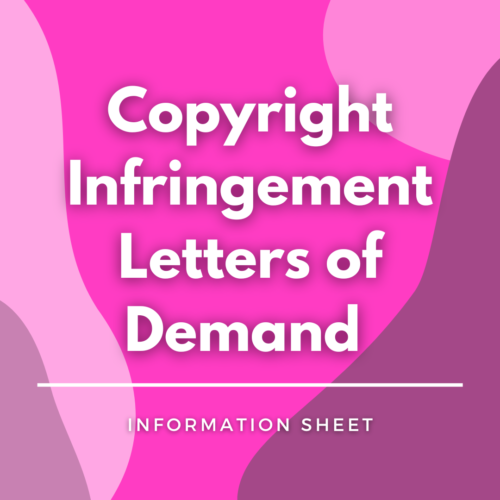PPCA Licensing
Who should use this information sheet?
This information sheet is primarily directed at small Australian record companies and independent artists (i.e. those not signed to a record label) who have signed up to the Phonographic Performance Company of Australia (PPCA).
Who are the PPCA and what do they do?
PPCA is a collecting society that represents the interest of record companies, Australian recording artists and grants licences for the broadcast, communication or public playing of recorded music or music videos.
There are several layers of copyright in a work. For example, a work could have the following layers of copyright:
- copyright in the sound recording;
- copyright in the musical work (i.e. the notes that make up the song); and
- copyright in the lyrics.
If a person or business intends to play a sound recording or music video in public that person must first get a licence. This will be the case even if what they are doing is not directly music related. For example, someone running a business must get a licence if the person is going to play music to its customers or staff.
A licence to use the copyright in a sound recording or music video can be sought from the owner of the sound recording/music video or from PPCA. PPCA is the collecting society dealing with copyright in sound recordings and it provides public performance and transmission rights licences for use of sound recordings and music videos.
In addition to the licence to use the sound recording, a licence to use the copyright in the music and lyrics (if there are any lyrics) is usually sought from the Australasian Performing Rights Association (APRA) or Australasian Mechanical Copyright Owners Society (AMCOS) (www.apra-amcos.com.au). In some circumstance’s permission will be sought directly from the songwriter and/or composer.
OneMusic offers businesses a combined APRA AMCOS and PPCA licence, which gives them all the necessary permissions to play music in public, rather than them having to go to each organisation to obtain a licence separately.
PPCA input agreement
PPCA will not license your sound recordings unless you have signed their input agreement and have developed a direct licensing policy. When you sign up to PPCA, you become a ‘licensor’ which essentially means giving PPCA permission to license the copyright in your sound recordings and collect licence fees on your behalf.
Arts Law provides free legal advice on the input agreement to all PPCA licensors.
Am I a PPCA licensor?
When you sign up to PPCA, you become a ‘licensor’ which essentially means giving PPCA permission to license the copyright in your sound recordings and collect licence fees on your behalf.
If you have signed a PPCA input agreement you are a PPCA licensor, unless either you or PPCA have terminated the agreement. If you have signed up to the PPCA artist direct distribution scheme, but have not signed an input agreement, then you are not a PPCA licensor and are not required by any PPCA input licence agreement to have a direct licensing policy.
What is direct licensing?
Direct licensing is an alternative to PPCA licensing. Instead of going to PPCA, the business seeking permission to use a sound recording goes straight to the copyright owner of the music to get a licence. This means that the copyright owner and the business directly negotiate the deal for the licence of the sound recording (e.g. the administration, payment, length of time, territory).
All record companies and independent artists that are PPCA licensors are required to have a direct licensing policy which outlines the circumstances where they will consider entering into a direct licence for the public performance and transmission rights for their sound recordings. This information sheet provides information for understanding this requirement.
Do I have to provide direct licensing?
You cannot be forced to directly licence your work. It is up to you to decide whether you wish to directly license the use of your sound recordings or music videos. However, if you are a PPCA licensor you must have a direct licensing policy. PPCA will continue to license your sound recordings in accordance with your input agreement, unless the agreement is terminated. If you decide that you do not want to directly license your sound recordings or music videos, then you must state this in your policy and you should state the reasons for this decision.
Why do I have to have a direct licensing policy?
All PPCA licensors must have a direct licensing policy due to conditions placed upon PPCA by the Australian Competition and Consumer Commission (ACCC) (www.accc.gov.au). The ACCC put this condition in place so that it is clear for consumers (e.g. businesses wanting to licence music) how they can obtain a licence and whether they must go to the PPCA or, if they can go directly to the copyright owner. You can draft your own policy or you can use the Arts Law sample policy.
What should I put in my policy?
Arts Law has developed a sample policy that you may use and adapt to your own needs. The sample policy is available free of charge to all PPCA licensors. The sample policy enables you to set out the procedure for direct licensing or to state that you are not currently offering direct licensing for public performance and transmission rights in your sound recordings.
It is up to you what you put into your policy. The ACCC requires that you produce a policy for the direct licensing of your sound recordings and that these should include:
- the contact person and relevant details; and
- the process users should follow to make an enquiry about the option of direct licensing.
When must my direct licensing policy be finalised?
You must publish a direct licensing policy within 60 days from the commencement date of your PPCA input agreement (the agreement you signed allowing PPCA to license your sound recordings and music videos).
Do I have to provide a copy of my policy on my website?
Your direct licensing policy must be available on your website. If you do not have a website then upon request you must provide a copy of the policy.
Do I have to provide a copy of my policy to PPCA?
You must provide a copy of your direct licensing policy to PPCA. Every time you change your guidelines you must provide an updated copy of the guidelines to PPCA. This is a term of your input agreement with PPCA.
Can I change my policy?
You can change your policy as often as you wish. If you find your policy is not suitable or that you are not following it, then you should change it to make it more appropriate for your needs and for the needs of the people seeking licences from you. If you change your policy you must provide the new policy on your website (if you have one) and send a copy to PPCA.
Can PPCA still provide blanket licences?
PPCA are still offering blanket licences and if you are a PPCA licensor you will continue to receive royalties from PPCA for the licence fees that they collect on your behalf. These are distributed in accordance with the PPCA distribution policy which can be accessed on their website (www.ppca.com.au). If you cannot access a copy online phone (02) 8569 1100.
Can I offer an exclusive licence?
If you have signed a PPCA input agreement, then any direct licences you enter into must be non-exclusive. An exclusive licence is one that is not offered to anyone else. If you grant a non-exclusive licence you can continue to use the work yourself and to grant licences to other people for the same sound recording.
Further information
- Arts Law Centre of Australia (www.artslaw.com.au) has developed a template direct licensing policy that you may use and adapt to your own business. These are available free of charge to all PPCA licensors. Arts Law can provide information and assistance on this information sheet, the sample direct licensing policy and any arts related legal inquiries. Phone (02) 9356 2566 or toll-free 1800 221 457.
- Australasian Performing Right Association / Australasian Mechanical Copyright Owners Society (www.apra.com.au) collects royalties for composers and songwriters. Phone (02) 9210 3000.
- Australian Competition and Consumer Commission (www.accc.gov.au) promotes competition and fair trade in the market place to benefit consumers, business and the community. Its primary responsibility is to ensure that individuals and businesses comply with the Commonwealth competition, fair trading and consumer protection laws. Phone 1300 302 502.
- Australian Copyright Council (www.copyright.org.au) provides legal advice on copyright and has a number of useful publications. Its information sheets may be accessed for free on its website or ordered via the telephone. Phone: (02) 9101 2377.
- Australian Recording Industry Association (www.aria.com.au) is the industry organisation representing record companies. In some circumstances ARIA can provide licences to copy sound recordings. Phone: (02) 8569 1144.
- Phonographic Performance Company of Australia Limited (www.ppca.com.au) is the collecting society dealing with copyright in sound recordings. Phone: (02) 8569 1100.
- OneMusic Australia (https://onemusic.com.au) OneMusic Australia is a joint initiative between APRA AMCOS and PPCA and is a one-stop-shop for businesses to obtain licences for the public performance of music. Phone: 1300 162 162
Disclaimer
The information in this information sheet is general. It does not constitute, and should be not relied on as, legal advice. The Arts Law Centre of Australia (Arts Law) recommends seeking advice from a qualified lawyer on the legal issues affecting you before acting on any legal matter.
While Arts Law tries to ensure that the content of this information sheet is accurate, adequate or complete, it does not represent or warrant its accuracy, adequacy or completeness. Arts Law is not responsible for any loss suffered as a result of or in relation to the use of this information sheet. To the extent permitted by law, Arts Law excludes any liability, including any liability for negligence, for any loss, including indirect or consequential damages arising from or in relation to the use of this information sheet.
© Arts Law Centre of Australia
You may photocopy this information sheet for a non-profit purpose, provided you copy all of it, and you do not alter it in any way. Check you have the most recent version by contacting us on (02) 9356 2566 or tollfree outside Sydney on 1800 221 457.
The Arts Law Centre of Australia has been assisted by the Commonwealth Government through the Australia Council, its arts funding and advisory body.




